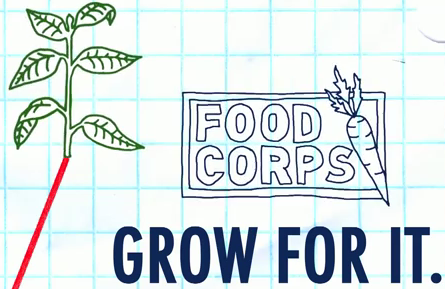One of the goals here at Grist is to inspire people to move beyond reading about problems and toward doing something about them. With that in mind, I thought I’d highlight a new anti-obesity initiative launching today designed to place young workers in communities to deliver nutrition education, build and tend school gardens, and implement farm-to-school programs: FoodCorps.
Cofounded by Grist contributor Deb Eschmeyer, an organic farmer and former communications director for National Farm to School Network, and Curt Ellis, codirector of the award-winning documentary King Corn, FoodCorps officially gets rolling today. The first cohort of 50 corps members is starting training in Milwaukee, Wis., where they’ll get a chance to learn from urban ag pioneer Will Allen at his Growing Power Community Food Center. The trainees will soon fan out to 10 states — Arkansas, Arizona, Iowa, Maine, Massachusetts, Michigan, Mississippi, New Mexico, North Carolina, and Oregon — to begin the work of bringing better nutrition and food choices to kids.
Eschmeyer declared in a statement, “As a nation, we are tightening our fiscal belt, yet health-related obesity costs are projected to reach $344 billion by 2018. FoodCorps is a sound investment in a healthy future and gives our kids a chance to beat back the painful and costly epidemic of diet-related disease.”
As I recently observed, most food education takes place in front of the television these days. If you’re going to combat that reality without billions in advertising dollars at your disposal, then schools are the place to do it. And as a parent, I can see how having young, energetic “doers” leading the charge in schools might engage kids more effectively than just adding new material to the class curriculum. Indeed, if they pick their corps members wisely, FoodCorps offers the possibility of grooming dozens, if not someday hundreds, of budding Jamie Olivers for placement in schools across the country. If you’re inspired to become one yourself, go here to learn how.
As budget cutters in Washington are doing everything they can to force government to abdicate its role of investing in our communities, FoodCorps turned to private sources including the W.K. Kellogg Foundation and Whole Foods’ Whole Kids Foundation for support (though FoodCorps does count AmeriCorps as a partner). Like the “locavesting” movement I wrote about the other day, this new organization is yet more evidence of how food reform is becoming one enormous DIY project.



